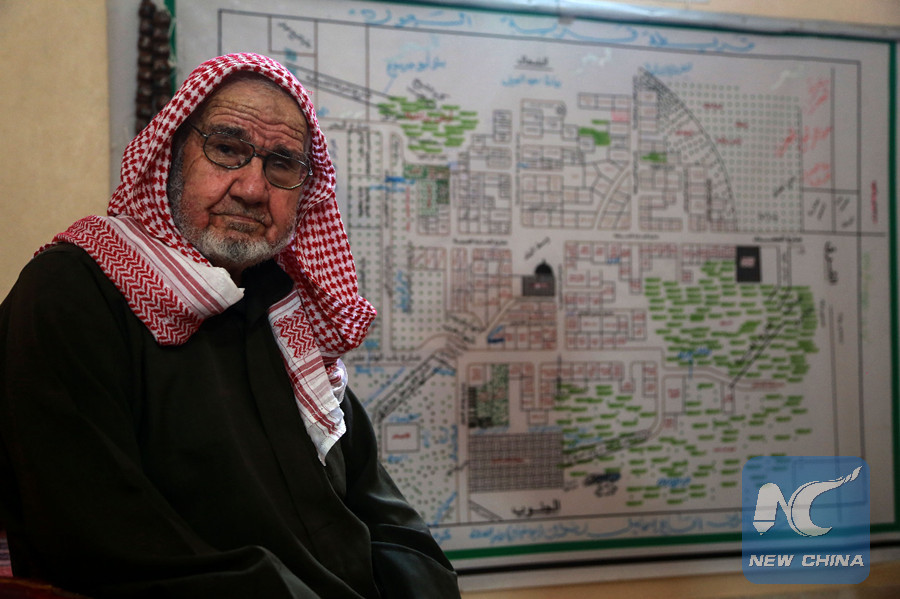
80-year-old Palestinian refugee Suleiman Radwan, sits in front of a map showing his birthplace Joarat Askalan village inside his house in a refugee camp in Gaza Strip. (Xinhua)
GAZA, May 17 (Xinhua) -- A group of Palestinian children sat around their 80-year-old grandfather, Suleiman Radwan, who was telling them about his childhood in Joarat Askalan village, before he fled to the Gaza Strip in 1948.
Using a big map of his birthplace placed on a wall at his home in Shati refugee camp in Gaza City, Radwan showed his sons and grandchildren the routes the villagers used when they were forced out of the village during the Arab-Israeli war in 1948.
Radwan was 10 years old when he had to leave his village with his family because of the frequent attacks of Jewish militias.
His seaside home village, which is 21 km north of the Gaza Strip, is now inhabited by thousands of Israelis, who changed the character of the small village.
A well-guarded barbed fence and an Israeli crossing block the old man from visiting his birthplace.
"I used to sneak to the village when I worked as a worker in Israel long years ago," Radwan told Xinhua. "But Israel stopped work permits for Gaza residents since eruption of the second Palestinian uprising in 2000."

80-year-old Palestinian refugee Suleiman Radwan sits in front of his house in a refugee camp in Gaza Strip. (Xinhua)
At the ongoing anti-Israel protests in Gaza, known as the "Great March of Return," Radwan, his sons and grandchildren are frequent participants.
The protests were launched on March 30 in five different locations along the borders between eastern Gaza Strip and Israel.
The rallies peaked on Monday, the day when Israel marks its declaration of independence, causing the death of 60 Palestinians and the injury of over 1,700 others.
The rally on Monday also came in response to the relocation of the U.S. embassy to Israel from Tel Aviv to Jerusalem, the holy city the Palestinians want its eastern part as the capital of their future state.
At least 111 Palestinians have been killed by Israeli gunfire since late March during the protests held to demand the return of Palestinian refugees to their homes in Israel.
The Nakba Day, or the Day of Catastrophe, is marked by the Palestinians on May 15 annually in memory of the forcible transfer of two thirds of the Palestinian people and ethnic cleansing of at least 418 villages as a result of the 1948 war.
Sitting in a tent near the Gaza-Israel borders during the anti-Israel protests, Radwan said that the Palestinians demonstrate for their return.
"We will return, this is what I tell my sons and grandchildren everyday," the old man said as he observed young Palestinians throwing stones at Israeli soldiers guarding the border fence.
Radwan's 45-year-old son, Ahmed, said he accompanies his father every Friday to the mass rallies in the northern Gaza Strip.
"My father tells people here about the sufferings his family and him faced during their journey from his village to Gaza," Ahmed told Xinhua.
"I fled with my parents and 11 other family members to Gaza on a fishing boat," the old man recalled sadly, "I cannot forget that day."

80-year-old Palestinian refugee Suleiman Radwan holds land certificate inside his house in a refugee camp in Gaza Strip. (Xinhua)
Radwan said the sea was calm, which helped them survive and arrive at the shores of Gaza.
He said he always hoped to travel to Jerusalem and study there, but he dropped this dream after he became a refugee.
"I worked as a fisherman in Gaza, but I had to stop working when I got old...my sons also work as fishermen now," he added.
The man teaches his grandchildren the history of Palestine and his home village after retirement.
"I still have the property documents of our home in Jorat Askalan and I also have the key of our home which I will pass to my sons and grandchildren," Radwan said with hope.

